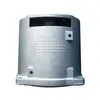Mobile:+86-311-808-126-83
Email:info@ydcastings.com
aluminium slab casting
The Process of Aluminium Slab Casting An Overview
Aluminium slab casting is a vital process in the manufacturing of aluminium products used in various industries, including automotive, aerospace, building, and electrical applications. The significance of aluminium lies in its lightweight nature, high strength-to-weight ratio, and excellent corrosion resistance. The casting of aluminium slabs not only optimizes the use of this versatile metal but also contributes to the development of efficient production techniques.
Understanding the Casting Process
Aluminium slab casting involves the transformation of molten aluminium into solid forms, specifically slabs, which can be further processed into sheets, plates, or other components. The process typically begins with the melting of aluminium ingots in a furnace at temperatures reaching up to 800°C. Once molten, the aluminium is alloyed with various elements, such as silicon, magnesium, and copper, to achieve desirable mechanical and physical properties tailored to specific applications.
After alloying, the molten aluminium is poured into a casting mold that is pre-heated to prevent thermal shock and ensure smooth flow. Various casting methods can be employed, with continuous casting being one of the most widely used techniques. In continuous casting, the molten aluminium is formed into a thin slab as it is cooled and solidified, creating a long, uniform product that can be easily cut into specified lengths.
Benefits of Aluminium Slab Casting
One of the major benefits of aluminium slab casting is the efficiency it provides. The continuous casting method not only reduces material waste but also optimizes production time as slabs are formed at a steady rate. Additionally, the process allows for better control over the composition and microstructure of the aluminium, producing higher-quality slabs with improved mechanical properties.
aluminium slab casting

Another advantage is the environmental aspect of aluminium slab casting. Aluminium is a highly recyclable metal, and using recycled aluminium in the casting process significantly lowers energy consumption and greenhouse gas emissions compared to primary aluminium production. This makes aluminium slab casting an eco-friendly choice for manufacturers looking to reduce their carbon footprint.
Applications of Aluminium Slabs
Aluminium slabs produced through casting have a wide range of applications. In the automotive industry, these slabs are essential for manufacturing lightweight components that improve fuel efficiency and reduce emissions. They are also used in the aerospace sector for producing parts that require a combination of strength and reduced weight.
In construction, aluminium slabs are integral for façades, roofing, and structural applications due to their durability and aesthetic appeal. Furthermore, in the electrical sector, aluminium slabs are utilized in the production of high-voltage transmission lines and components, leveraging the metal's excellent conductivity.
Conclusion
In conclusion, aluminium slab casting is a crucial manufacturing process that not only underscores the importance of aluminium as a material but also showcases modern production techniques that emphasize efficiency and sustainability. As industries continue to innovate, the demand for high-quality aluminium slabs is expected to grow, driving advancements in casting technology and further enhancing the role of aluminium in various applications. The future of aluminium slab casting looks promising, with an ongoing focus on improving methods and sustainability in production practices.











